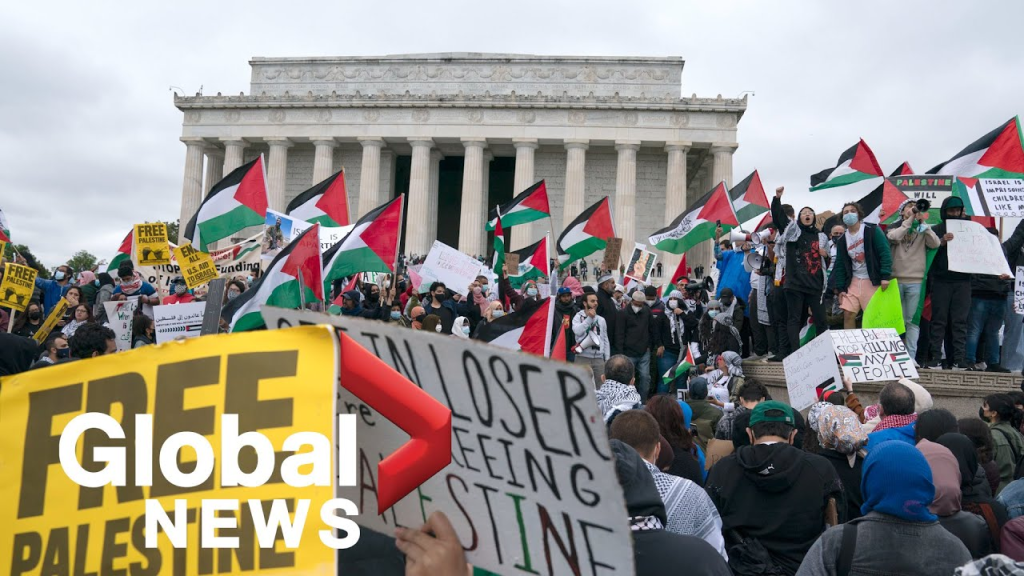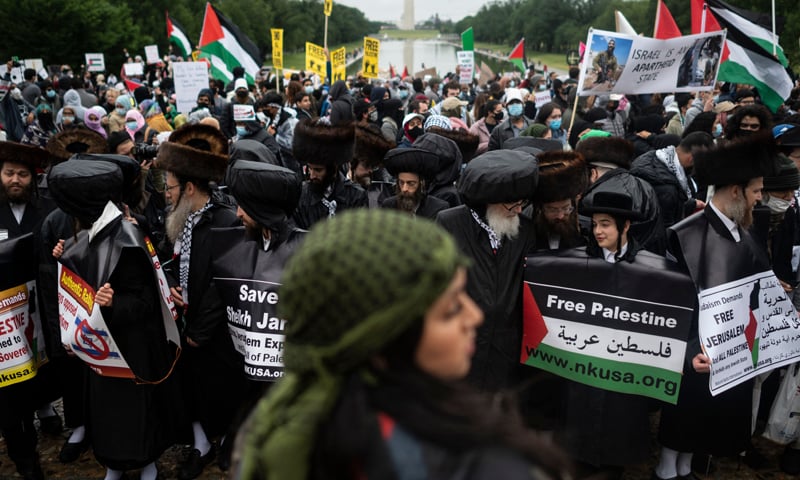The conflict between Israel and Palestine has long been a topic of intense debate and passionate support on both sides. Recent pro-Palestinian events in the United States have further fueled the controversy, triggering outrage from many politicians and prompting discussions about the ongoing treatment of Palestinians by Israel. In this article, we will delve into the key details surrounding these events, exploring the motivations behind the marches, reactions from various groups, and the broader implications of this ongoing conflict.
Understanding the Pro-Palestinian Movement
The pro-Palestinian movement in the United States is driven by progressive and far-left groups, as well as Islamic political organizations, that have long advocated for Palestinian independence. These groups aim to shed light on Israel’s treatment of Palestinians and their struggle for self-determination in the generations-old conflict over land.

Pro-Palestinian protest marches have taken place in major cities across the country, including Atlanta, Chicago, Denver, San Diego, and Washington, D.C. These marches have attracted hundreds of people who raise their voices in solidarity with the Palestinian cause. However, it’s important to note that these events have not been without controversy.
The Chant that Sparks Debate
During these pro-Palestinian marches, a particular chant has caught the attention of critics. The chant, “From the river to the sea, Palestine will be free,” has raised concerns due to its interpretation as a call for the establishment of a Palestinian state that could potentially eliminate Israel from the map. This interpretation has fueled tensions between pro-Israel and pro-Palestinian activists, leading to scuffles and clashes at some of these rallies.
It is crucial to recognize that not all supporters of the pro-Palestinian movement endorse this chant or the extreme interpretation associated with it. Many supporters focus on raising awareness about the plight of Palestinians without advocating for the elimination of Israel. However, the presence of such controversial chants has added fuel to the already contentious debate.
The Harvard Student Groups’ Statement
The pro-Palestinian movement has even reached prestigious educational institutions like Harvard University. Around 30 student groups, many led by Arab or Muslim activists or students with ties to predominantly Muslim countries, co-signed a letter that holds the Israeli regime entirely responsible for the unfolding violence. These groups describe Israel as a colonial apartheid country, drawing parallels with other historical instances of oppression.
The statement from these Harvard student groups reflects a perspective that holds Israel accountable for the ongoing conflict and emphasizes the importance of acknowledging the historical context of the situation. However, it is essential to consider multiple viewpoints and engage in constructive dialogue to fully understand the complexities of the Israeli-Palestinian conflict.
The Historical and Political Context
To comprehend the motivations and arguments made by pro-Palestinian activists, it is crucial to examine the historical and political context of the conflict. In the 1940s, both Israelis and Palestinians were supposed to receive a state, according to the United Nations. Israel successfully established its state, whereas the Palestinians did not.

More recently, the situation in Gaza has garnered attention due to its isolation and the presence of giant walls erected by Israel. Critics argue that these walls restrict the movement of Palestinians and contribute to their marginalization. However, it is important to consider that Israel has justified these security measures as necessary to protect its citizens from terrorist attacks.
The most recent events, which triggered outrage among many politicians, involved Hamas fighters targeting Israeli civilians, including women and children. These attacks, characterized by the deliberate killing and kidnapping of innocent Israelis, have intensified the debate and raised questions about the activists’ stance on these actions.
Reactions and Responses
The pro-Palestinian events in the United States have elicited strong reactions from various political figures. In New York City, where one of the marches took place, Governor Kathy Hochul described the rally as abhorrent and morally repugnant. Senator Chuck Schumer criticized the event as cold-hearted, while Congresswoman Elise Stefanik condemned the student statement from Harvard as abhorrent and heinous.
These condemnations highlight the deep divisions and polarizing nature of the Israeli-Palestinian conflict. The responses from politicians reflect their own perspectives, affiliations, and the desire to address the concerns of their constituents. However, it is essential to approach the issue with nuance and engage in constructive dialogue to work towards a peaceful resolution.
The Security Measures and Tensions
In response to the pro-Palestinian events, the New York City Police Department (NYPD) has increased security around synagogues and Jewish community organizations. These measures aim to ensure the safety of the Jewish community amidst the escalating tensions surrounding the Israeli-Palestinian conflict.
The heightened security measures underscore the need to address the underlying causes of the conflict and find a peaceful resolution. It is crucial to recognize that the safety and well-being of all communities involved are of paramount importance and that acts of violence only perpetuate the cycle of hostility.
Diverse Perspectives within the Pro-Palestinian Movement
It is important to emphasize that the pro-Palestinian movement encompasses a diverse range of perspectives and approaches. While some supporters may condone or justify the actions of Hamas, there are also individuals and groups who advocate for nonviolent resistance and peaceful means of achieving Palestinian independence.
One example is Manolo De Los Santos, the head of The People’s Forum in New York City, who defended his organization’s right to peacefully protest and criticize Israel for its treatment of Palestinians. In a phone conversation, De Los Santos acknowledged the tragic loss of life on both sides and expressed regret for the suffering endured by Palestinians.
Understanding the diversity of perspectives within the pro-Palestinian movement is crucial for fostering dialogue and promoting a better understanding of the complex dynamics at play in the Israeli-Palestinian conflict.
The Broader Implications
The pro-Palestinian events in the United States have far-reaching implications for the ongoing Israeli-Palestinian conflict. They serve as a reminder that the issue is not confined to the Middle East but resonates with people across the globe. These events highlight the power of grassroots movements to raise awareness, challenge long-standing narratives, and shape public discourse.
The controversy surrounding the pro-Palestinian movement also underscores the need for open and respectful dialogue. By engaging in meaningful conversations that recognize the multiple perspectives and historical complexities of the conflict, we can work towards a peaceful resolution that ensures the rights and dignity of both Israelis and Palestinians.
Conclusion
The pro-Palestinian events in the United States have ignited passionate debates, drawn attention to the ongoing Israeli-Palestinian conflict, and sparked controversy. Understanding the motivations and perspectives of pro-Palestinian activists is crucial for fostering dialogue and working towards a peaceful resolution. By acknowledging the historical and political context, embracing diverse viewpoints, and engaging in constructive conversations, we can contribute to a more nuanced understanding of this complex issue and strive for a future of peace and justice in the region.
Additional Information: It is important to strike a balance between advocating for the rights of Palestinians and recognizing the security concerns of Israel. The ultimate goal should be to seek a just and lasting solution that respects the rights and aspirations of both Israelis and Palestinians.

